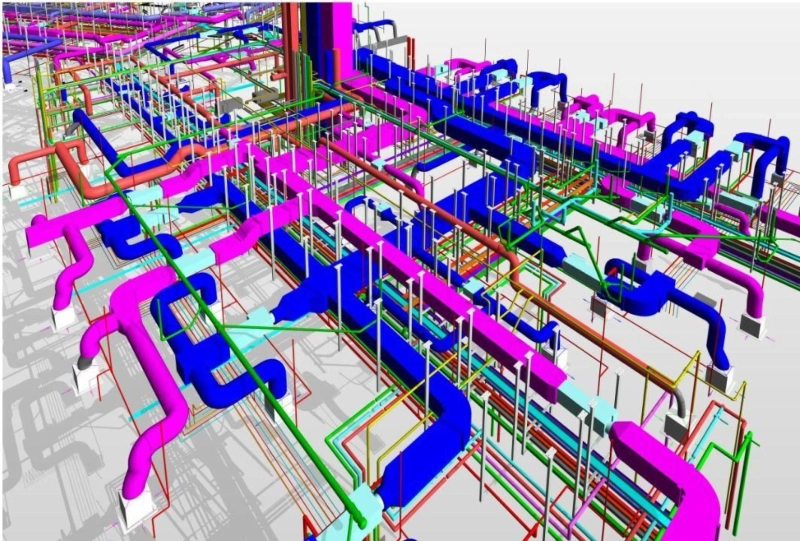Building design and construction have evolved dramatically over the years, incorporating advanced technologies and methodologies to ensure structures are safe, comfortable, and efficient. One critical aspect of modern construction that plays a significant role in achieving these goals is MEP services. MEP, which stands for Mechanical, Electrical, and Plumbing, encompasses the crucial systems that make buildings habitable and functional. This article explores the various components and importance of MEP services, highlighting their role in the construction industry.
Introduction to MEP Services
MEP services are integral to any building project, involving the design, installation, and maintenance of mechanical, electrical, and plumbing systems. These services are essential for ensuring that buildings are energy-efficient, safe, and comfortable for occupants. MEP engineering covers a broad range of tasks, from heating and cooling systems to electrical wiring and water supply.
Mechanical Services in MEP
Mechanical services in MEP focus on heating, ventilation, and air conditioning (HVAC) systems, as well as other mechanical aspects of a building such as elevators and escalators. The primary goal of mechanical services is to ensure that indoor environments remain comfortable and conducive to occupants' well-being.
Heating, Ventilation, and Air Conditioning (HVAC): HVAC systems are critical for regulating the temperature and air quality within a building. They ensure that indoor spaces remain comfortable regardless of external weather conditions. HVAC design involves selecting the appropriate systems and equipment to provide adequate heating, cooling, and ventilation.
Elevators and Escalators: These mechanical systems are essential for the efficient movement of people within multi-story buildings. Proper design and installation of elevators and escalators enhance accessibility and convenience for occupants.
Electrical Services in MEP
Electrical services encompass all aspects of a building's power supply, distribution, and utilization. Proper electrical design is crucial for ensuring safety and efficiency.
Power Supply and Distribution: Electrical engineers design systems to distribute power throughout a building safely. This includes the installation of transformers, switchboards, and circuit breakers to manage and control the flow of electricity.
Lighting Systems: Adequate lighting is vital for both functionality and aesthetics. Electrical services involve designing lighting layouts, selecting appropriate fixtures, and ensuring energy-efficient solutions.
Fire Alarm and Security Systems: Electrical engineers also design and install fire alarm and security systems to protect buildings and their occupants. These systems are critical for early detection of hazards and ensuring a quick response to emergencies.
Plumbing Services in MEP
Plumbing services in MEP focus on the design and installation of systems that manage water supply and waste removal. Effective plumbing is essential for maintaining hygiene and health standards in buildings.
Water Supply Systems: Plumbing engineers design systems to ensure a reliable and safe supply of water for drinking, cooking, cleaning, and other uses. This includes selecting appropriate materials and ensuring compliance with health and safety regulations.
Waste Removal Systems: Proper waste removal is crucial for maintaining sanitary conditions within a building. Plumbing services involve designing systems for the efficient removal of wastewater and sewage, as well as stormwater management.
Importance of MEP Services
MEP services are fundamental to the successful completion of any construction project. They ensure that buildings are not only functional but also safe and comfortable for occupants. Here are some key reasons why MEP services are essential:
Energy Efficiency: Properly designed MEP systems can significantly reduce a building's energy consumption. Efficient HVAC systems, energy-saving lighting, and effective water management contribute to lower operational costs and a smaller environmental footprint.
Safety and Compliance: MEP services ensure that buildings comply with safety regulations and standards. Electrical systems are designed to prevent hazards such as fires and electrical shocks, while plumbing systems maintain hygiene and prevent waterborne diseases.
Comfort and Convenience: MEP systems are crucial for creating comfortable living and working environments. HVAC systems regulate indoor temperatures, lighting systems provide adequate illumination, and plumbing systems ensure a reliable water supply.
Sustainability: Modern MEP services incorporate sustainable practices and technologies to reduce environmental impact. This includes the use of renewable energy sources, water-saving fixtures, and eco-friendly materials.
Challenges in MEP Services
While MEP services are vital, they also come with their own set of challenges. These include:
Coordination and Integration: Integrating mechanical, electrical, and plumbing systems within a building's design requires careful coordination. Any oversight can lead to conflicts and inefficiencies.
Complexity: MEP systems are complex and require specialized knowledge and expertise. Designing and installing these systems involves understanding various technical aspects and adhering to strict regulations.
Maintenance: Ensuring the longevity and efficiency of MEP systems requires regular maintenance. This involves routine inspections, timely repairs, and upgrades to keep systems functioning optimally.
Innovations in MEP Services
The field of MEP services is continuously evolving, with new technologies and innovations enhancing efficiency and effectiveness. Some notable trends and advancements include:
Building Information Modeling (BIM): BIM is revolutionizing the way MEP services are designed and implemented. This digital tool allows engineers to create detailed 3D models of building systems, facilitating better coordination and reducing errors.
Smart Building Technologies: The integration of smart technologies in MEP services is making buildings more intelligent and responsive. Automated systems for lighting, HVAC, and security improve efficiency and enhance user experience.
Sustainable Solutions: There is a growing emphasis on sustainability in MEP services. Innovations such as solar power, energy-efficient HVAC systems, and water recycling technologies are helping reduce the environmental impact of buildings.
The Role of MEP Engineers
MEP engineers play a crucial role in the successful implementation of MEP services. Their responsibilities include:
Design and Planning: MEP engineers design and plan the systems required for a building. This involves creating detailed blueprints and specifications to ensure all systems work together seamlessly.
Installation and Commissioning: Engineers oversee the installation of MEP systems, ensuring they are installed correctly and function as intended. They also commission the systems, testing them to verify performance and compliance with standards.
Maintenance and Troubleshooting: Ongoing maintenance is essential for the longevity and efficiency of MEP systems. Engineers conduct regular inspections, perform necessary repairs, and troubleshoot any issues that arise.
Conclusion
MEP services are the backbone of modern building design and construction, ensuring that structures are safe, comfortable, and efficient. By integrating mechanical, electrical, and plumbing systems seamlessly, MEP services contribute to the overall functionality and sustainability of buildings. As technology advances and the demand for energy-efficient and sustainable solutions grows, the role of MEP services will continue to be crucial in shaping the future of construction.
Understanding the importance and intricacies of MEP services is essential for anyone involved in the building industry, from architects and engineers to contractors and property owners. By prioritizing these services, we can create buildings that not only meet the needs of today but also contribute to a more sustainable and efficient future.


